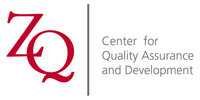The knowledge gathered from alumni surveys about study conditions and the acquirement of expertise during academic studies, about career entry and the career fortunes of graduates is of central importance for higher education institutes in many ways.
The compatibility between academic studies and professional demands and prospects are now factors that receive greater consideration when individuals choose where to study. Higher education institutes are faced with the task of providing an adequate study program to educate students in the best way possible, and enable them to offer the qualifications and skills that are required in the market place. In this respect, the retrospective assessments of study conditions and the expertise acquired during their academic studies by former students provide valuable information. In the context of accreditation and re-accreditation procedures, information from alumni about the organization and content of studies has proven to be an important additional assessment tool, which can highlight both a need for optimization and illustrate strengths. Information about the careers of former students is important for both the development of degree courses and for the provision of service offerings such as student counseling and career services. Furthermore, it also raises the question of creating a sense of attachment between former students and their higher education institute, and of interest in further education and the development of appropriate courses.
The alumni survey for Rhineland-Palatinate was, with the support of the Ministry for Education, Science, Further Education and Culture in Rhineland-Palatinate, implemented nationwide. Starting with the graduation year 2005, alumni of the Rhineland-Palatinate members of the south west evaluation association of higher education institutes will regularly be asked two years after completion of their studies about their career, their links to their former higher education institute, study conditions and the development of expertise during their academic studies.
The Rhineland-Palatinate alumni study stands out not least because of its inclusion of doctoral candidates. Information about the professional situation and study assessments of alumni with a doctoral degree is collected nationwide and across disciplines in an unparalleled manner. In view of the increasing relevance of structured doctoral studies, the responses from the former doctoral candidates provide information about the need to adapt the doctoral program, and about the specific supervisory needs of doctoral candidates.
